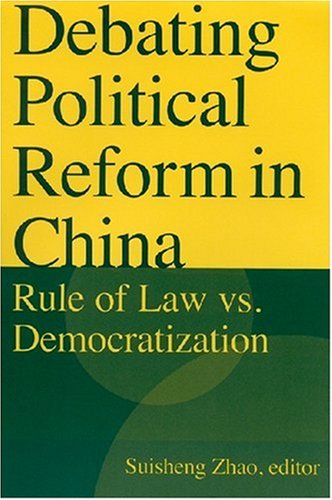|
|
楼主 |
发表于 2008-10-16 12:24:09
|
显示全部楼层
http://ifile.it/nz4pu1a/0765617315.zip
http://www.filefactory.com/file/114fce/n/0765617315_zip

Debating Political Reform in China: Rule of Law VS. Democratization
By Suisheng Zhao
--------------------------------------------------------------------------------
Publisher: M.E. Sharpe
Number Of Pages: 295
Publication Date: 2006-06-26
ISBN-10 / ASIN: 0765617315
ISBN-13 / EAN: 9780765617316
Binding: Hardcover
--------------------------------------------------------------------------------
Summary: "Consultative rule of law" as a non-cross-culture debate
Rating: 4
Initial Impression:
The question of "Why has China not embraced democracy?" must be answered by also looking at the following questions:
1. What are the reasons of China's "dynastic cycle"?
2. Why can market capitalism go without multi-party contested democracy?
3. What are the causes of contested democracy?
4. Does contested democracy really have its "moral superiority"?
All these questions need to be addressed with an open mind in reference to China's party politics (meritocracy as a form of oligarchy) and America's democratic reality (plutocracy as a form of oligarchy).
Comments on Pan Wei's paper:
Pan's simple characterization of "periodic election" and "rule of law" produces some refreshing ideas that are strikingly similar with those by New Institutional Economics (NIE). But Pan's focus is more comparative politics than comparative cultural Economics. The argument that rule of law rather than electoral democracy leads to political stability, social freedom, and economic prosperity echoes NIE's view that social development is the result of adaptive institutions and their effective enforcement with intentionality.
However, pan's paper is too much utilitarian-oriented and policy-driven and its simple characterization fatally lacks necessary theoretical thickness required by the topic. Its analysis on Chinese culture emphasizes the harmonious aspect yet neglects its autocratic and connection-based nature, which unfortunately causes the negligence of the leadership structure issue and the law enforcement issue. As a result, it offers only a simplistic two-point analysis for China's dynastic crisis, and takes an idealistic view for "rule of law" (as if law enforcement is automatic and culturally neutral). A bigger problem is it uses this single-dimension cultural argument to explain why China can't embrace democracy, which makes it fail to avoid looking only at one corner inside the box and fail to stand out of the box to be sensitive to the normative value issue and the cultural psychology issue.
Overall, it feels like Pan is using a dinner table knife to fight on two fronts of a risky war. To Chinese policy makers, his "consultative rule of law" is still too radical (especially the separation of government power, and the four basic freedoms); to those Western liberalists who are trapped in the "one culture prison", it fails to convince them with only the analysis of Third World failing democracy and American democratic imperialism. When he asks himself a grand question like "Why has China not embraced democracy?", it is simply impossible to avoid John Rawls and James Buchanan, not to mention a perspective from cultural psychology. With these all said, Pan's paper is a huge success in terms of drawing academic and policy attention at this time.
Comments on reviews by Randall Peerenboom, Larry Diamond, and Edward Friedman:
Pan Wei is not the only one who defines democracy as "periodic election". Like Schumpeter, Adam Przeworski gives a minimalist definition with "contested election" (1991, 2000). Pan's point is that "rule of law democracy" is more important than "electoral democracy", especially when China now needs an operational strategy to pursuit its political reform. The problem of Pan is, he is too policy-minded to clearly spell out and distinguish the fine lines of operational strategy, comparative analysis, and moral values.
That leads to Peerenboom's critique on his elitism. Peerenboom is fair, un-evasive to the debating points, and also context-sensitive which allows him to add some useful aspects to the discussion (mostly from his book China's long march toward rule of law). His problem is not being self-reflective enough--not being cognitively careful about how culture may condition his own view. As a result, he is either not being honest about the logical flaws of the democratic values or simply having them in his blind spot.
Of course, this is Larry Diamond's problem too, only that Larry Diamond is much more an idealistic context-insensitive universalist. Given Larry Diamond's reputation on the subject, one would expect some useful dimensions from some of those many books edited by him. Yet he has nothing to offer, maybe his mind is with the "Squandered Victory" in Iraq. His review feels like a sleep-talking that has nothing to do with Pan's point.
Edward starts from "In intercultural exchange, it is important for all parties to learn from each other, especially about themselves", he throws away Pan's fine point within his definition and starts shooting around with his extensive historical facts without caring about the relevance. He is too eager to defend the point that democracy can't be argued by culture because democracy is now widespread in every culture. Abstract values, we can all enjoy talking, but Pan's concern is strategic options, for China, now. What is being argued here is if "rule of law" is more important than "electoral democracy", especially for China, and if yes, is it possible at all. Assuming the simple truth and universal attractiveness of democracy and taking the "shared destiny" for granted are not helpful. |
|